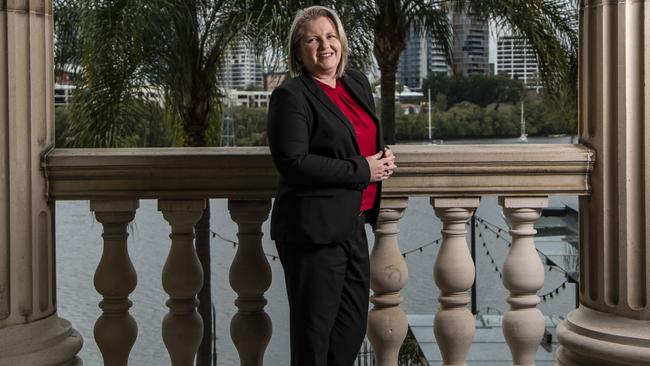Earlier this year liquidators were told to gear up for what could be the busiest period ever as the toll of the COVID-19 pandemic was expected to wreak havoc on businesses of all sizes.
But now despite being in a recession, unprecedented government interventions mean company insolvencies have slowed to a trickle.
Andrew Fielding laughs when asked if it’s the most exciting time in his career.
The born and raised Brisbane boy who is BDO’s national leader of business restructuring reckons it’s almost the opposite, and in terms of insolvency “the most boring time” in his 30-year career.
Five-week wait: NSW could be locked out til Nov
Qantas pulls $20m in sponsorship, dumps Wallabies
Fielding, who ran his own shop for many years before being bought out by BDO in 2009, considers himself lucky to have a variety of work beyond pure insolvency.
“There would be insolvency firms that are on JobKeeper at the moment primarily because with the extension of provisions we’ve got, there is the best part of 2000 companies that would have been wound up across Australia in the normal course of business, forgetting COVID, that haven’t been,” he says.

“So for a lot of smaller firms, the phones aren’t ringing.
“I’m lucky with BDO, I am working with clients doing things outside of the insolvency area. If I was a specialist insolvency firm like I used to be I’d be struggling to pay the bills.
“You’ve got to remember COVID has had an awful effect on the insolvency industry but we were already in a declining market.”
He notes the banking royal commission had a major impact as battered banks gave up appointing liquidators in huge numbers – a move that is not commercially viable long term but is here to stay for a while yet.
Those other jobs include financial adviser to the aged care royal commission and cashed up private equity deals.
He says the big question everyone is asking is how long government will keep propping up businesses – something he says would be (unsurprisingly) better done by providing funding for them to get advice from the likes of himself now instead of just extending provisions that currently protect directors from insolvent trading and limit creditors make demands for payments.
“It would support the insolvency industry which, as much no one likes undertakers, we are a necessary evil. We need to be there to clean up the mess,” he says.

Almost as an answer to his call, the Federal Government this week announced a major shake-up of the insolvency system targeted at seeing small businesses survive past the COVID relief system due to end on December 31.
Come January 1, business owners will have 20 business days to come up with a plan to restructure the company with a small business restructuring practitioner, with creditors then given 15 days to vote on the plan.
It will also waive fees to register as a liquidator for the next two years, to encourage more practitioners into the market.
Allowing company directors to trade while insolvent and defer some payments until December 31, is just delaying the inevitable according to FTI Consulting senior managing director Kelly Trenfield.
“The moratorium the government has brought in has kicked the can down the road,” she says. “It’s turned today’s concerns into tomorrow's problems. I don’t think that solves the issue, I think it is deflecting.”
Trenfield, a titan of Brisbane’s finance and restructuring industry, says the changes prevent other businesses recovering debts from people they have provided services to.
“It’s policy on the fly without consulting with people who deal with insolvencies and administrations on a daily basis.
“The impact will run for a length of time and we could be feeling this for years to come,” says Trenfield, who has worked in the UK for Merrill Lynch, ANZ Investment Bank and The Exchequer of the Republic of Ireland, and was also appointed Joint Administrator and Liquidator when Queensland Nickel (QNI) collapsed in 2016, leaving 800 people out of work.

Recalling the QNI appointment, Trenfield says it was a mammoth task due to the number of stakeholders and highlights how the industry has evolved.
“You get in there in the trenches with the workers. We’re not where we were in the 80s where liquidators were grim reapers out to hatchet everyone and close businesses down,” she says. “You go from having done research and conducing meetings … to actually being in there boots and all.
“It’s working with the individuals as we’re dealing with the scenario … it’s taking their concerns into account.”
Back in March Jarvis Archer, a partner in mid-sized firm Revive Financial, was in talks with his own set of companies suffering with huge debts owed to the ATO.
However, communication fell silent when the government announced soon after that “no payments are required until the end of the year”.
Archer, an 18-year veteran of the insolvency sector, also tips this will mean the number of collapses will skyrocket when those payments are again due in early January.

“These businesses won’t be improving; they’ll be accruing more and more debts they can’t pay,” he says.
Archer entered the insolvency industry in 2002 and has since held positions at large and small firms in Australia and the UK.
Now the Noosa-based liquidator, who focuses on small and medium-sized businesses, believes this is one of the most challenging times for the insolvency industry.
“In March 2020, insolvency firms were advertising for staff and since April they have been laying them off,” he says. “It’s very hard to see where the insolvency industry is heading, largely due to the government’s ongoing intervention.”
The federal government is considering sweeping reforms to the business restructuring model, which could lower the cost of administration for smaller businesses and, Archer believes, could reduce the prevalence of phoenix activity.
He says the most difficult part of his work is watching a business fail when it could have been prevented.
“I often see business owners spend five to 15 years working hard in their business to build some equity in their home, only to lose it all in the months before insolvency.
“Culturally in Australia, we need to better understand the help that’s available,” he says.
“Many small business owners don’t get help or seek help too late.
“Consequently, by the time they need help their business is no longer able to be rescued.”
Rescuing rather than liquidating is the path forward for Hall Chadwick partner Ginette Muller, who started her craft in 1998, but now specialises in complex insolvencies and is taking on more restructuring jobs as her industry is ripe for innovation.

She agrees it will most likely be next year before the full COVID fallout is seen and it could be worse than if it was dealt with now.
“I’m not sure anyone’s going to be shutting those off on December 31 so that on the first of January it’s open slather,” she says.
“Now, if those zombie companies are just at home doing nothing and just collecting JobKeeper, OK it’s annoying for the taxpayer probably, but it’s not hurting others.
“(But) if those people are getting credit from others and know that they are insolvent then you are going to have a double whammy effect, and that’s what I think is the real problem.
“In normal times making directors take advice, having a plan and then letting them be excused from insolvent trading, that’s fair enough but to just give every single company director in Australia a get out of jail free in a sense to enable them to go around in a zombie-like state potentially causing damage to other good businesses – I’m not actually sure that’s a good thing.”
“We are in a depression and we’re down 50 per cent in insolvencies of a normal year. It’s not what you would have expected,” she says.
“Our industry was ready for some disruption. It wouldn’t hurt us to have to deal with some innovation.
“Are there ways we could do a more efficient and better job so that we can handle more? Are all these liquidations for example going to need to come through traditional insolvency firms or is there another way of dealing with distress?”
She means low cost or no frills insolvency as something that might have to happen, especially where the only or major creditor is the tax office and little in the way of assets are left for liquidators to call upon.
“I have been doing it for a long time but I hope I’d never become immune to people’s feelings. I think that’s why for me I'm sort of moving to safe harbour and the consulting side. I find it far more interesting to help out clients with a positive direction.
“The whole reason we have had safe harbour clients is because they are thinking about the potential downside – they are across it and they understand they could go into liquidation but we hope they don’t and most of mine haven’t.”


Add your comment to this story
To join the conversation, please log in. Don't have an account? Register
Join the conversation, you are commenting as Logout
High-end grocer Harris Farm Markets suffers $22m loss
High end supermarket Harris Farm Markets is known for charging a premium for groceries but it didn’t protect the family owned company from posting an eye-watering loss that saw it breach bank covenants and undergo urgent refinancing.
‘Wall’ of elderly baby boomers looming as nation’s key challenge
Leading demographer Bernard Salt says baby boomers will start turning 80 next year with health and aged care services set for the ultimate test.